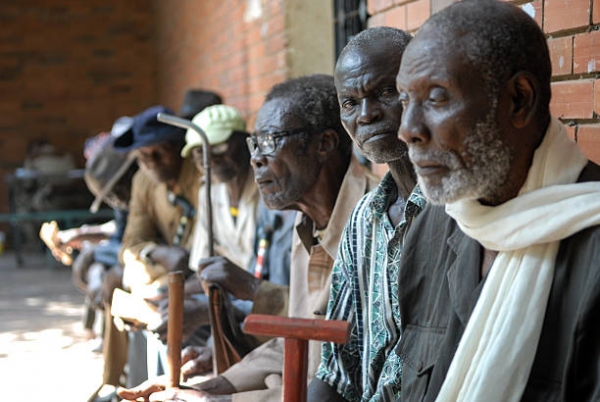52-year-old Alimi Abali is a refugee in the Forkoloum camp, where he escaped with his wives and children after an Islamic terrorist attack hit his village. Here, the middle-age man is seen as a village chief, or “Boulama”, in Chadian Arabic, as, among other things, he is responsible for resolving problems and tensions that arise within the community. Contrary to other families that arrived in the camp, Alimi and his relatives were able to build a proper house using solid circular huts built with reeds from the lake and wooden branches collected in the bush. The family even has a chicken coop and a horse that they use “like a bicycle, for daily travel”, Alimi jokes. But what is maybe their most valuable “asset” is the grocery stall owned by Alimi’s wife, Yaka Moussa. She opened it less than two years ago. “We received some money from UNHCR and with that we bought bulk commodities to resell”, she says, indicating the basic goods they sell, including peanuts, oil, drinks and washing powder.
This is only one of many refugees’ stories inside Chad, a complex country with a difficult past, which today still faces several profound issues. Immediately after proclaiming independence from France in 1960, the nation was devastated by what became a long-standing conflict between the Arabs of the North, Muslims and with a feudal past, and the black Christian population of the South. This led to two rough decades of conflict between the two factions, each guided by different rebel fronts, which were however united in the will of subverting the current single-party government and freeing the country from the still heavy French influence. In the end, in November 1981, the Armed Forces of the North (FAN) of Hissène Habré, which had retreated into Sudan in December 1980, reoccupied all the important towns in eastern Chad. Peacekeeping forces of the Organization of African Unity (now the African Union) withdrew in 1982, and Habré was able to form a new government in October of the same year.
Alongside all such issues, during those years Chad also had to face the wave of Islamic terrorism violence that afflicted the entire North and Central Africa. With one of the strongest armies in Central Africa, Chad was nevertheless able to move to the forefront of the antiterrorism fight, even deploying its soldiers in other neighbouring countries, such as Mali, in 2013. Meanwhile, among the several Islamic militant groups present in the area, one of them, which was also one of the most powerful, Boko Haram, began to move beyond its base in Nigeria, launching attacks in Chad itself and other nearby countries. Chad, however, took a leading role in efforts to combat the group, which, in turn, led to an increase in Boko Haram terrorist attacks inside the nation.
In the meantime, the run-up to the 2016 presidential election saw an unprecedented amount of protests against Deby’s regime and its repressions, including demonstrations and a general strike that brought business in many areas to a standstill. Nonetheless, Déby, who faced 13 other candidates, was favoured to win the April 10 election and effectively did it, with officials declaring that he received almost 62 percent of the vote. However, even before the results were released, some opposition leaders voiced allegations of voting fraud, and there was much criticism of the communications blackout during and after the election. A new constitution was promulgated in May 2018: among the changes were those that expanded the presidential powers. The post of prime minister was abolished, and the president’s term was changed from five years, with no term limits, to six years, with a limit of two terms. The changes to the president’s term, however, would not be applied retroactively, meaning that Déby could potentially remain in office until 2033. Parliamentary elections that had been due in 2015 but continually postponed were once again further delayed, with polls eventually scheduled for late 2021. In the April 2021 presidential election, held while rebels attacked from the north, Déby was declared the winner, but on April 20, the military announced that the president had been killed in battle with rebels on the border, and rather than following the constitution, which dictated that the president of the National Assembly should be named interim head of government, they instead dissolved the government and the Assembly. They established a National Council of Transition to govern the country for 18 months, with new elections to be held at the end of the transition period. Déby’s son, Mahamat Idriss Déby Itno, was meanwhile named interim president.
Sources:
https://www.britannica.com/place/Chad/History
https://en.wikipedia.org/wiki/Chadian_Civil_War_(2005%E2%80%932010)
Author: Pasquale Candela; Editor: Valentina Cova




